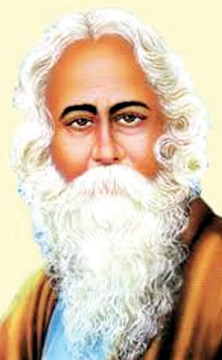Tagore celebration at ICC
In celebration of the great poet Rabindranath Tagore's 153rd birth
anniversary, the Indian Cultural Centre (ICC)organised a cultural
rendition of some of his works last Wednesday.
It was a unique cultural event to celebrate the great man. Narthaki -
an evening of Sri Lankan, Indian and Bengali dance was showcased
transcending cultural barriers and giving a new look to traditional
music and dance.
It was a reverberating experience indeed when the various drums from
the geta bera to the thammattama began throbbing to various beats with
the dextrous movements of the hands of the drummers and then reached a
crescendo.
|

Rabindranath Tagore |
The dancers in one item danced to the drum beats of the drummers and
what a sight it was! The various dances were a kind of blend of India,
Sri Lanka and Bangladesh, Tagore's birthplace they took the stage by
storm and held the limited audience spellbound. Wednesday was a rainy
day and many were delayed or held back due to a severe traffic delay.
The dancers spelt out the many rhythms of the dance in no uncertain
terms. Kusapaba was a sight to behold with the story being conveyed
through the imaginative dancing act of the couple.
It was a superb performance for which Chandana Wikcramasinghe had
earlier won an award for his performance. He told tell the story of
Kusabawathi in an emotional manner conveying its nuances.
Rabindranath Tagore (1861-1941) was the youngest son of Debendranath
Tagore. He was educated at home.
At 17 he was sent to England for formal schooling.He did not finish
his studies there. In his mature years, in addition to his many-sided
literary activities, he managed the family estates, a project which
brought him into close touch with common humanity and increased his
interest in social reforms.
He also started an experimental school at Shantiniketan where he
tried his Upanishadic ideals of education. From time to time he
participated in the Indian nationalist movement, though in his own
non-sentimental and visionary way; and Gandhi, the political father of
modern India, was his devoted friend. Tagore was knighted by the ruling
British Government in 1915, but within a few years he resigned the
honour as a protest against British policies in India.
Tagore had early success as a writer in his native Bengal. With his
translations of some of his poems he became rapidly known in the West.
In fact his fame attained a luminous height, taking him across
continents on lecture tours and tours of friendship. For the world he
became the voice of India's spiritual heritage; and for India,
especially for Bengal, he became a great living institution. Although
Tagore wrote successfully in all literary genres, he was first of all a
poet. Besides these, he wrote musical dramas, dance dramas, essays of
all types, travel diaries, and two autobiographies, one in his middle
years and the other shortly before his death in 1941. Tagore also left
numerous drawings and paintings and songs for which he wrote the music
himself.
-Fahima Farisz
|

